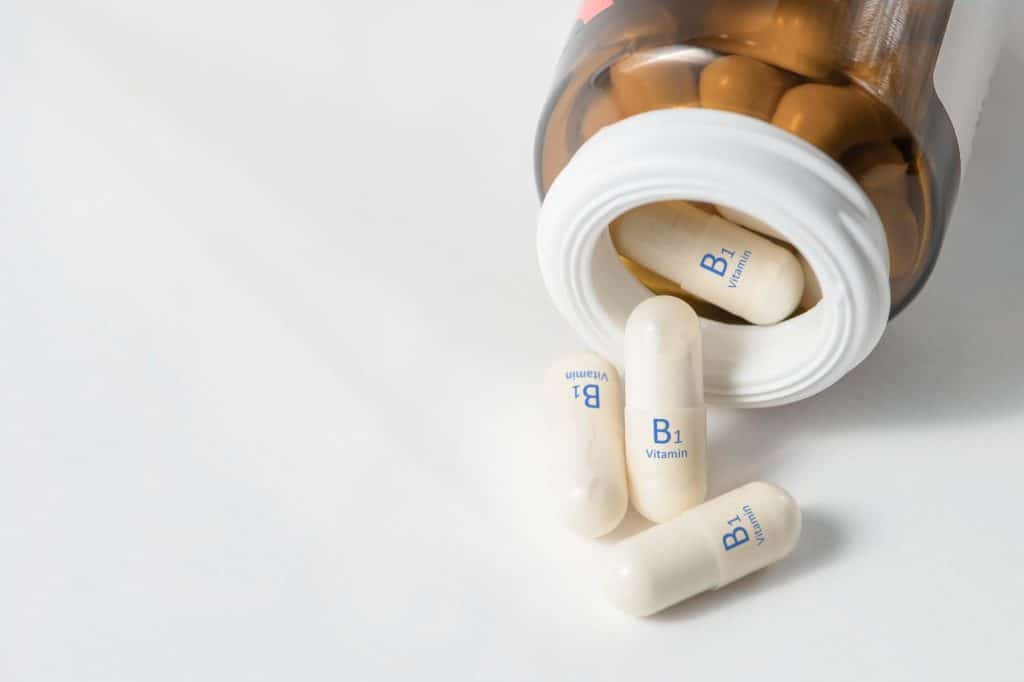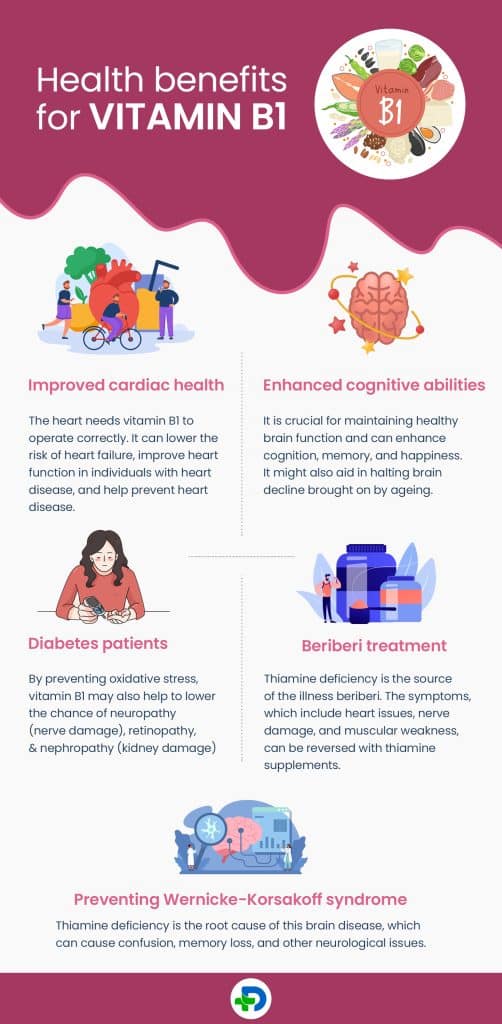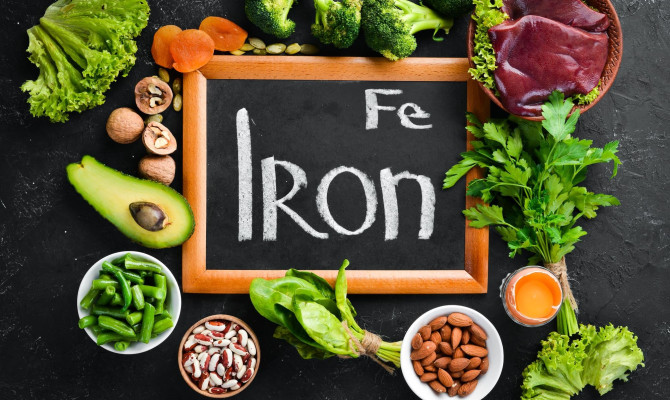Vitamin B1 (Thiamine): Sources and Significance

- Vitamin B1 (Thiamin)
- 14 Aug 2023
Overview
What is Vitamin B1 ?
Thiamine, also known as vitamin B1, is a water-soluble vitamin necessary for the body to operate correctly.
One of the eight B vitamins, it plays a role in many metabolic functions. It can be discovered in many different foods and nutritional supplements. Your body uses it to convert sustenance into energy.1Overview| Researched based study from Nih.gov
The significance, applications, and warning signs of its deficiencies will all be covered in this write up.

Biological Role
Role in the body
Energy production
- As the body’s primary energy source, carbs’ metabolism depends on thiamine. It aids in turning carbs into glucose, which the body’s cells use as fuel.2Biological role| Researched based study from Nlm.nih.gov
Nervous system function
- The nervous system must operate correctly. The synthesis of neurotransmitters, the chemical messengers that transfer messages between nerve cells, is essential for their production. It also contributes to developing myelin, the covering that protects nerve filaments.2Biological role| Researched based study from Nlm.nih.gov
Synthesis of DNA and RNA
- The genetic materials that contain the directions for cell growth, maintenance, and development are required to create DNA and RNA.2Biological role| Researched based study from Nlm.nih.gov
Metabolize amino acids
- Involved in the metabolism of amino acids, the protein’s building components. It aids in breaking amino acids and their transformation into compounds the body can utilize.2Biological role| Researched based study from Nlm.nih.gov
Fatty acid metabolism
- Fatty acids are used to produce energy and as the foundation for cell membranes, and it is also engaged in their metabolism. 2Biological role| Researched based study from Nlm.nih.gov
Benefits

Health benefits
Improved cardiac health
- The heart needs vitamin B1 to operate correctly. It can lower the risk of heart failure, improve heart function in individuals with heart disease, and help prevent heart disease. 3Health benefits | Researched based study from Nlm.nih.gov
Enhanced cognitive abilities
- It is crucial for maintaining healthy brain function and can enhance cognition, memory, and happiness. It might also aid in halting brain decline brought on by ageing. 3Health benefits | Researched based study from Nlm.nih.gov
Diabetes patients
- By boosting insulin sensitivity and lowering the chance of developing insulin resistance, thiamine supplementation may assist people with diabetes with better glucose metabolism. Additionally, reducing inflammation and enhancing lipid metabolism enhances arterial health.
- By preventing oxidative stress, vitamin B1 may also help to lower the chance of neuropathy (nerve damage), retinopathy, and nephropathy (kidney damage). 3Health benefits | Researched based study from Nlm.nih.gov
Beriberi treatment
- Thiamine deficiency is the source of the illness beriberi. The symptoms, which include heart issues, nerve damage, and muscular weakness, can be reversed with thiamine supplements. 3Health benefits | Researched based study from Nlm.nih.gov
Preventing Wernicke-Korsakoff syndrome
- Thiamine deficiency is the root cause of this brain disease, which can cause confusion, memory loss, and other neurological issues. 3Health benefits | Researched based study from Nlm.nih.gov
Sources
What are the Dietary sources of Thiamine?
You can get thiamine from several different dietary sources. Here are a few reliable sources:
Whole grains
- They are a top thiamine source. Oatmeal, whole wheat bread, and brown rice are all healthy choices.7Sources| Researched based study from Nih.gov
Legumes
- Beans, lentils, and peas are excellent sources of legumes.
Nuts and seeds
- Walnuts, peanuts, and sunflower seeds.
Pork
- One of the top sources of vitamin B1 is pork. Pork includes about 0.8 mg of thiamine per 3-ounce serving. 7Sources| Researched based study from Nih.gov
Foods that have been fortified
- Thiamine is added to various meals, including bread, pasta, and breakfast cereals. 7Sources| Researched based study from Nih.gov
Dairy items
- Yoghurt, milk, and cheese are all excellent options.7Sources| Researched based study from Nih.gov
Vegetables
- Thiamine is present in some veggies, including Brussels sprouts, spinach, and asparagus. 7Sources| Researched based study from Nih.gov
Deficiency Symptoms
What are the symptoms of Vitamin B1 deficiency?
Weakened muscles.
- Lack of thiamine can cause muscular weakness, especially in the legs, due to decreased muscle energy production. Myopathy, a disorder that affects the muscles, can also result from it. Myopathy can result in discomfort, cramping, and weakness.
Nerve damage
- It may harm the nerves, resulting in tingling or numbness in the hands and feet. Thiamine is essential for nerve cells to produce the necessary energy for correct operation.
- Pain, numbness, tingling, and weakness in the limbs and legs are symptoms of peripheral neuropathy. 4Symptoms| Researched based study from Nlm.nih.gov
Reduced appetite
- Due to the body’s inability to correctly convert carbohydrates into energy, people who are vitamin B1 deficient may have a decreased appetite or aversion to food.As a result, there may be a reduction in the number of calories and minerals consumed, which may lead to weight loss and other health issues.5Symptoms| Researched based study from Nlm.nih.gov
Fatigue and weakness
- Fatigue, weakness, and weariness can also result from thiamine deficiency. In severe instances, thiamine deficiency can result in beriberi, a condition marked by extreme tiredness and muscle wasting.
Confusion and irritation
- There could be confusion, irritability, and other brain issues. It has also been linked to several psychiatric conditions, such as depression and anxiety.5Symptoms| Researched based study from Nlm.nih.gov
Digestion issues
- Constipation, anorexia, nausea, vomiting, and abdominal pain are all possible digestive issues.
Oedema
- A lack of vitamin B1 can result in fluid retention, which can cause swelling in the feet, legs, or other body areas.
Syndrome Wernicke-Korsakoff
- Wernicke-Korsakoff syndrome, marked by memory loss and other neurological symptoms, can develop in severe instances.5Symptoms| Researched based study from Nlm.nih.gov
Deficiency
What causes a lack of vitamin B1?
Poor diet
- It is more prevalent in regions where diets are deficient in thiamine-rich foods.
Alcoholism
- The body’s ability to absorb thiamine is hampered by alcohol. 6Deficiency| Researched based study from Nih.gov
Absorption disorders
- Thiamine and other nutrients may not be adequately absorbed due to certain digestive systems disorders like inflammatory bowel disease, celiac disease, and persistent diarrhea. 6Deficiency| Researched based study from Nih.gov
Weight loss procedure/ Bariatric surgery
- Surgical procedures like gastric bypass surgery can cause nutrient loss.
Dialysis
- Long-term users could be more susceptible to thiamine shortage. 6Deficiency| Researched based study from Nih.gov
Both nursing and pregnancy
- Pregnant or nursing women need larger doses of thiamine and may be highly susceptible to the deficiency if their diet is inadequate.
Genetics
- Uncommon hereditary conditions like Maple Syrup Urine Disease and thiamine-responsive megaloblastic anaemia syndrome 6Deficiency| Researched based study from Nih.gov can also cause thiamine deficiency.
Dosage
What is the suggested amount to consume Vitamin B1?
Thiamine, or vitamin B1, has a different suggested daily allowance (RDA) depending on age and gender. Here are the most recent guidelines for thiamine consumption. 1Overview| Researched based study from Nih.gov
- Infants 0-6 months): 0.2 mg
- Infants (7-12 months): 0.3 mg
- Children (1-3 years): 0.5 mg
- Children (4-8 years): 0.6 mg
- Children (9-13 years): 0.9 mg
- Adolescents (14-18 years): 1.2 mg for males, 1 mg for females
- Adults (19 years and older): 1,2 mg for males, 1.1 mg for females. 1Overview| Researched based study from Nih.gov
- Pregnant and breastfeeding women: 1.4 mg
Adults are typically advised to consume no more than 100 milligrams of vitamin B1 daily. It is essential to remember that these are only general recommendations and that each person’s requirements may change based on their diet, health, and medication regimen.1Overview| Researched based study from Nih.gov
Interaction
Interaction with medicines
- Diuretics: Diuretics can cause thiamine to be lost in the urine and cause a deficit.
- Antacids: They can lessen the amount of thiamine absorbed from the intestinal system.
- Antibiotics: Tetracycline, one type of drug, can reduce absorption. Chronic alcohol use can make it harder for thiamine to be absorbed and cause more of it to be excreted.8Interaction| Researched based study from Nih.gov
- Chemotherapy medications: Due to higher metabolic demand and decreased absorption, chemotherapy medications can result in thiamine deficiency. 8Interaction| Researched based study from Nih.gov
Prevention
How to prevent the deficiency of vitamin B1?
- Consume a balanced diet made up of a range of items.
- Be sure to cook your food to keep the thiamine content correctly. Thiamine can be destroyed by boiling and extended cooking.
- Keep your alcohol intake in check.
- If you are in danger of a deficiency, such as a pregnant or nursing woman, an alcoholic, etc., consider taking supplements.
- Consider seeking medical help if you encounter any of the thiamine deficiency symptoms.
Any feedback on this article?
 This Articles content was accurate
This Articles content was accurate Very Informative Article
Very Informative Article I have a question or a comment
I have a question or a comment
 This article contains inaccurate content
This article contains inaccurate content This article was not helpful
This article was not helpful I have a question or a comment
I have a question or a comment
We appreciate your helpful feedback!
Checkout our social pages
References
-
National Institutes of Health
Thiamin-Fact Sheet for Health Professionals | Overview | Dosage
-
National Library of Medicine
Vitamin B1 (Thiamine) | Biological Role
-
National Library of Medicine
B Vitamins: Functions and Uses in Medicine
-
National Library of Medicine
A Review of the Biochemistry, Metabolism and Clinical Benefits of Thiamin(e) and Its Derivatives | Deficiency
-
National Library of Medicine
Vitamin B1 Thiamine Deficiency | Symptoms of Deficiency
-
National Institutes of Health
Thiamin-Fact Sheet for Consumers | Deficiency | Prevention
-
National Institutes of Health
Thiamin | Dietary Sorces
-
National Library of Medicine
Drug–nutrient interactions: discovering prescription drug inhibitors of the thiamine transporter ThTR-2






































